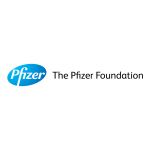Grants to help strengthen health systems and reduce health disparities in underserved communities in Africa, Asia and Latin America
NEW YORK–(BUSINESS WIRE)–The Pfizer Foundation announced today 20 grants* to help non-governmental organizations (NGOs), non-profits and social enterprises address critical health challenges related to infectious diseases, including the increasing threat of antimicrobial resistance (AMR), in some of the world’s most vulnerable communities. Recipients of the one-year Global Health Innovation Grants (GHIG) include partners in 12 low- and middle-income countries, that will each receive US $100,000, for a total investment this year of US $2 million by The Pfizer Foundation.
Globally, infectious diseases are responsible for an estimated 8.4 million deaths annually and are a leading cause of death worldwide, particularly among young children and marginalized populations in underserved communities,1 often perpetuating the cycle of poverty. It is estimated that the rise of AMR, which occurs when pathogens evolve to withstand the effect of even the most effective medicines, now accounts for approximately 700,000 of these deaths.2 Without action, this number could reach ten million deaths per year by 2050,2 and could cost the world an estimated US $100 trillion in lost productivity in the same amount of time.3 The World Health Organization (WHO) included AMR in its list of ten threats to global health in 2019.4
“Mounting infectious disease outbreaks and the threat of large-scale antimicrobial resistance are increasingly becoming some of the most challenging global health needs of our time,” said Caroline Roan, President of The Pfizer Foundation. “We are dedicated to working with individuals and organizations in local communities as they rethink and scale innovative solutions to fight infectious diseases from the ground up, providing effective solutions to those patients most in need.”
The Pfizer Foundation’s flagship GHIG program is managed in partnership with Innovations in Healthcare (IiH), a nonprofit organization hosted by Duke University. The GHIG program combines grant investments with technical support to help accelerate global health innovations by giving partners the autonomy to navigate the unique and fluid challenges they face in their local – and often last mile – communities. The Pfizer Foundation and IiH work together to analyze results from each partner program in order to build on key learnings and pivot approaches, when needed.
Launched in 2016, the GHIG program has had incredible impact to date: 370,000 new patients have received care, 160,000 have been reached with screening and education, and 2,000 health workers have been trained. With the inclusion of this cohort of grants, total funding to date by the GHIG program totals $7.5 million.
The 20 organizations included in this year’s cohort of grants each take a community-tailored approach to finding and scaling sustainable solutions to overcome infectious diseases. There is a strong focus across the grants on strengthening local healthcare systems and building capacity, including through primary healthcare delivery and the integration of innovative health technologies in low-resource settings. Examples include:
- The expansion of a clinical staff training program by Muso in Mali to support clinicians at government-run health centers to improve quality of care as it relates to infectious disease, maternal and child health and core clinical issues driving preventable deaths such as childhood pneumonia, malaria and maternal hemorrhage;
- The launch of UE LifeSciences’ new innovation cervAIcal, an artificial intelligence-enabled, hand-held, wireless mobile colposcope to aid health workers and healthcare providers in detecting precancerous lesions at the point of care in regions of India with limited infrastructure; and
- Group for Technical Assistance in Nepal will develop, implement and evaluate Global Learning in Anti-Microbial Resistance, an e-learning platform and web-based information repository containing curriculum to set up AMR programs in health facilities across the country, including opportunities for live communication and mentoring via webinars with health providers.
This new GHIG cohort demonstrates Pfizer’s continued commitment to infectious disease and supports Pfizer’s ongoing efforts to reduce health disparities.
*The Pfizer Foundation is proud to support the following partners in this cohort of grants:
2020 MicroClinic (Kenya); Afya Research Africa (ARA) (Kenya); Care 2 Communities (Haiti); Fundación Vive Con Bienestar – Bive (Colombia); Group for Technical Assistance (Nepal); Health Builders (Rwanda); Jacaranda Health (Kenya); Last Mile Health (Kenya); LifeNet International (Uganda); Muso (Mali); NAYA JEEVAN for Kids (Pakistan); North Star Alliance (Sub-Saharan Africa); One Family Health (Rwanda); Penda Health (Kenya); Possible Health (Nepal); Society for Nutrition, Education, and Health Action (SNEHA) (India); Swasth Foundation (India); THINKMD (Nigeria); UE LifeSciences (UELS) (India); Unjani Clinics NPC (South Africa).
About the Pfizer Foundation
The Pfizer Foundation is a charitable organization established by Pfizer Inc. It is a separate legal entity from Pfizer Inc. with distinct legal restrictions. The Foundation’s mission is to promote access to quality healthcare, to nurture innovation, and to support the community involvement of Pfizer colleagues.
About Innovations in Healthcare
Innovations in Healthcare (IiH) is a nonprofit dedicated to improving healthcare worldwide by supporting the scale and impact of promising innovations. Hosted by Duke University and founded in 2011 by Duke Health, McKinsey & Company, and the World Economic Forum, IiH brings together healthcare leaders, funders, and innovators across the globe to increase access to affordable, quality care.
References:
1Global Burden of Disease Tool [Data set], University of Washington, Institute for Health Metrics and Evaluation, Global Health Data Exchange, 2019. Accessed July 16, 2019 from http://ghdx.healthdata.org/gbd-results-tool.
2No Time to Wait: Securing the Future from Drug-Resistant Infections: Report to the Secretary-General of the United Nations. Inter-Agency Coordination Group on AMR. April 2019. Accessed August 1, 2019 from https://www.who.int/antimicrobial-resistance/interagency-coordination-group/IACG_final_report_EN.pdf?ua=1.
3Tackling Drug-resistant Infections Globally: Final Report and Recommendations, Review on Antimicrobial Resistance, May 2016. Accessed July 16, 2019 from https://amr-review.org/sites/default/files/160525_Final%20paper_with%20cover.pdf.
4Ten Threats to Global Health in 2019. Accessed August 1, 2019 from https://www.who.int/emergencies/ten-threats-to-global-health-in-2019.
Contacts
Media:
Sally Beatty
347-330-7867
sally.beatty@pfizer.com

